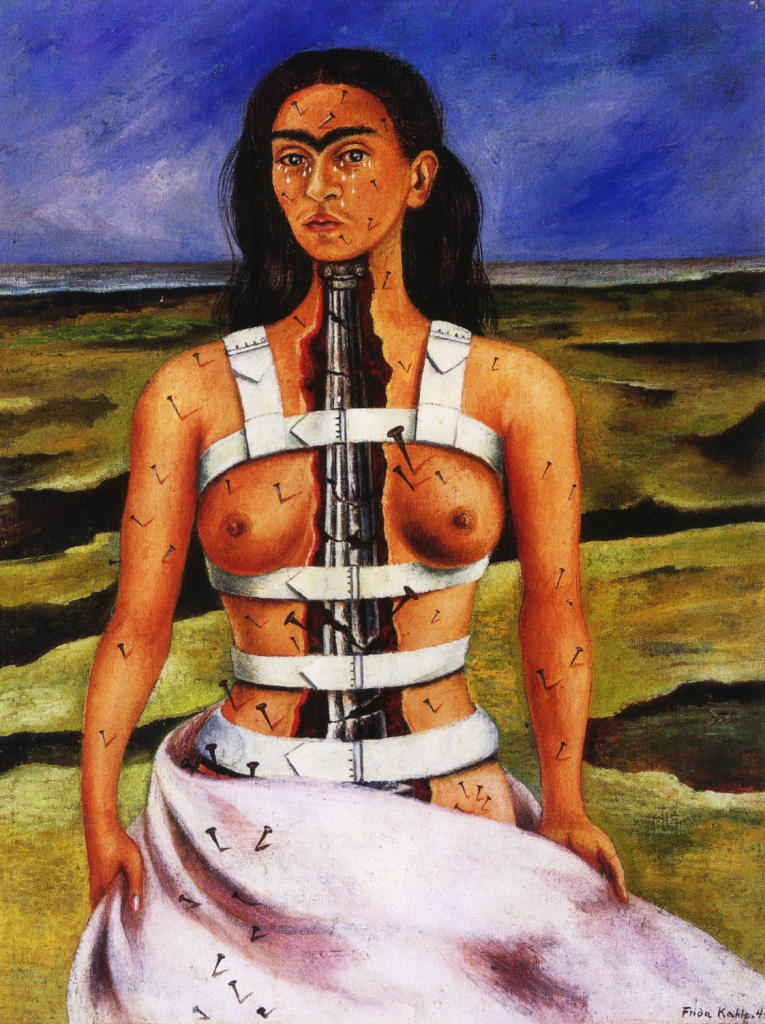As part of my Friday blog post recovery project, I repost today one of a series of essays on pain–the one that mysteriously disappeared from my blog–written in October of 2009. (Links to the other posts are provided at the end of the essay.) At the time, I had one friend who was dying of cancer, and I also remembered vividly a previous student who was (and probably still is) suffering from a migraine that attacked her one day in high school and never left.
As an aside, I note that the student assistant who has been helping me identify and retrieve the missing posts suffers from perpetual pain herself. Since she was a girl, Vera Damanka has been been the victim of fibromyalgia, neuropathy, and possibly a variant of multiple sclerosis. Vera, who needs a wheel chair, has fashioned a student-designed neuroscience major and she hopes to attend medical school after she graduates. It meant a lot to me that she found meaningful the other essays on pain. She hasn’t seen this one yet and I dedicate it to her.
Here’s a poem that deals directly with pain, from Kahlil Gibran’s The Prophet. I don’t entirely understand it but I’m intrigued by some of its claims:
“And a woman spoke, saying, “Tell us of Pain.”
And he said:
Your pain is the breaking of the shell that encloses your understanding.
Even as the stone of the fruit must break, that its heart may stand in the sun, so must you know pain.
And could you keep your heart in wonder at the daily miracles of your life, your pain would not seem less wondrous than your joy;
And you would accept the seasons of your heart, even as you have always accepted the seasons that pass over your fields.
And you would watch with serenity through the winters of your grief.
Much of your pain is self-chosen.
It is the bitter potion by which the physician within you heals your sick self.
Therefore trust the physician, and drink his remedy in silence and tranquility:
For his hand, though heavy and hard, is guided by the tender hand of the Unseen,
And the cup he brings, though it burn your lips, has been fashioned of the clay which the Potter has moistened with His own sacred tears.”
Gibran, of course, may not be talking only about physical pain, but since that’s our focus this week, let’s read the poem with that in mind. “Much of your pain is self chosen” is an intriguing idea. Novelist Rachel Kranz, whose excellent response to yesterday’s post I recommend, has taught me that our illnesses often can be interpreted as metaphorical expressions of psychological trauma. (Of course, misfortune that is clearly not your doing doesn’t count unless you believe in kharma or paying for sins in a past life.) If we interpret our pain accurately, we achieve a deeper self knowledge and learn about the issues we must confront.
I would like to believe, as Gibran advises, that we could approach our pain with wonder and joy, the way we should approach the miracles of daily life. It seems hard to imagine doing so, however, when one is fighting a headache or experiencing stabbing sinus pains (how my own pain usually manifests). Yet I heard once that the poet Rainer Maria Rilke, whose sensuous poetry captures his openness to life, rejected pain medication when he was dying of leukemia. That was so that he could be open to all that life dished out, the painful as well as the pleasurable. The seasonal changes, as Gibran puts it.
Did he watch the world with serenity in that state? It’s hard to imagine.
For a counter vision, there is Tom Robbins’ Fierce Invalids Home from Hot Climates (2000). I don’t like the book the way I do his earlier works, but I vividly remember the book’s protagonist trying to use transcendental meditation to cope with the pain of insect attacks and other discomforts while traveling through the Amazon jungle. After several unsuccessful attempts, he finally gives up and opts for the cocaine that his native guides use as a painkiller.
So Romantics and visionaries embrace pain as a breaking of the stone at the heart of the fruit, trusting that new understanding will emerge. They advise that we drink the bitter cup, perhaps a reference to Christ in the Garden of Gethsemane. (According to Matthew, the day before his crucifixion, Christ prayed that God would “let this cup pass from me” and then surrendering, acceded to his destiny: “nevertheless not as I will, but as thou wilt.”) Tranquil acceptance and trust in the “tender hand of the Unseen,” the Potter who weeps for us, is the recommended response to pain.
But the comic novelist, who focuses on the non-transcendent body, says that pain is a pain and that’s all there is to it.
I wish Robbins were wrong, but it’s easier to say that pain is a powerful tool for enlightenment when one is feeling well than when one is suffering.
Other Posts on Pain
Perpetual Migraines and Julian of Norwich
Can We Imagine Another’s Pain?


